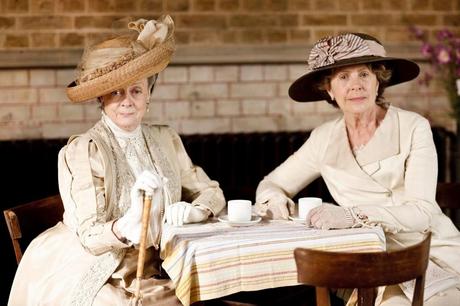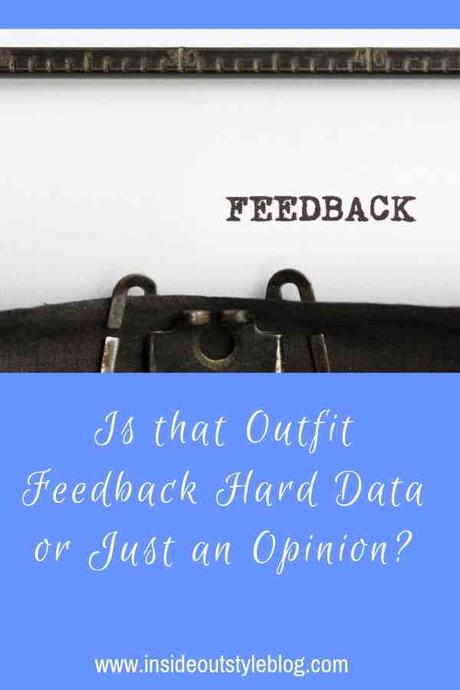Ever had what you consider to be a little harsh outfit feedback? What one person thinks of as a compliment or an offhand comment, can be felt by the recipient to be cruel and hurtful. Before you decide to retreat from the world and never ask for outfit feedback, remember that feedback isn't necessarily criticism or an attack on you as a person. Good feedback can help you grow and become more stylish so much faster than just attempting to do it all on your own. In fact, feedback from Thinking Style types (in the Myers Briggs/Psychological type preferences) means that the person cares enough to take the time and energy to give you some feedback, otherwise they just wouldn't bother at all. It's showing that they care and want to help you improve (particularly if you're asking for feedback on your outfit).
This reminds me of this little scene in Downton Abbey

Lady Violet Crawley, the Dowager Countess:
You are quite wonderful, the way you see room for improvement wherever you look. I never knew such reforming zeal.
Lady Violet Crawley, the Dowager Countess:
I must have said it wrong.
Before you take any sort of comment on your appearance to heart, I want you to do these things.
Stop and ask yourself:
Is this feedback about me or themselves?
Let's look at one example:
"I like your outfit but I couldn't wear it"In this example, I like your outfit (positive) but I couldn't wear it (possibly a negative, possibly not), before you jump to a conclusion that this is some sort of "backhanded insult" stop to think what could they really be saying - are you interpreting the information correctly or not? Is this really about you or about themselves?
I couldn't wear it might mean:
- you have a body shape that just is so different from mine, those styles just don't suit me but it looks great on you
- you have colouring or contrast that is different from mine, so that outfit, which looks great on you, wouldn't work on me
- you are wearing an outfit that works amazingly for your personality, but mine is different and therefore it would not look right on me as I'd not be comfortable in that outfit
- your lifestyle is very different from mine, so even though you look great in the outfit, it's not right for me
I could keep going with this example to show you how many more ways this is not a criticism, just a statement or even a thought about that person's own style, rather than something negative about yours.
When you receive any feedback, you need to think to yourself, before you jump to any conclusions "what is the story I'm telling myself here?" (this is a really useful tool I've picked up from Brene Brown and is in her book Rising Strong, but you can read this excerpt to get a quick overview or watch the video below). This technique helps you check the narrative you're telling yourself in your head, and it shows that you understand that you may not be 100% accurate with that narrative.
So frequently, when someone says something (writes it, however it's delivered), it's super easy to get the wrong end of the stick. If you quickly to go to your own self-talk and ask yourself what story you're telling yourself and see whether or not you are reading more into the feedback that wasn't actually there or intended, this can help you to not feel hurt by feedback that was never intended to hurt you. Telling the person what you are getting from their communication, telling them what the "story you're telling yourself" is, will help them realise more about how their communication is being understood. It also allows you to ask the person who made the comment what they actually meant by it. You may be surprised at just how wrong you've got it sometimes!
Is this feedback hard data or opinion?
"I don't like that neckline on you as it sits above your second balance point"Secondly, it's time to look at any outfit feedback and ask yourself - is this hard data or just an opinion?
Just like the first example, you can take this more than one way.
Data or Opinion?
I don't like is a statement of opinion, not fact. ... sit above your second balance point is a statement of data (if the person making the statement is correct).
Well, I don't like fish, lots of people in the world LOVE fish. Does this make either of us wrong? No, it's our own personal preferences. It's neither right nor wrong.
So, the data part - sits above your second balance point - how much does this point matter to you?
This will come down to your personality, do you want to stick within the "style rules" and always follow them, or are you ok to break them (as they are just guidelines anyway)?
Maybe this is something that you hadn't realised and you care about rectifying, it's feedback not criticism, or it could be something that you say "yes sure, but I'm wearing a necklace that sits at my first balance point, the colour of my top is light so it's not a really obvious thing, and to tell the truth, I don't care! I've got a long enough neck and it really doesn't matter to me. It's a casual outfit and I'm not about to go to a lot of trouble to alter the neckline."
How you take on feedback is up to you.
So much feedback is an opinion. If you care about that person's feedback, then take it on board if you wish, but remember, you're not obligated to. But if you don't care about their opinion, feel free to ignore it - remember, it's not fact, just a point of view that may differ from yours! You may decide there is a subsection of your world that you care about their feedback, and decide to ignore all others opinions and feedback. That's totally OK.
 Asking for Feedback
Asking for Feedback
When asking for feedback about outfits (which many do on my online forums and programs), it's important to let others know what kind of feedback you want.
- Do you want to know what is right or wrong technically? Relating to Style Guidelines or Rules? This is a data gathering process, remember to sort the data from the opinions!
- Do you want to know if people like it or not (you'll never get consensus there), what is the purpose of this? You're gathering opinions, not facts or data! How much of this will you take to heart?
- Do you want to know if others see it fit your style recipe? Again, all opinions, never fact here! How well does the feedback giver know you? How much do you care about their opinion?
Remember, there is so much context around anything you wear - lifestyle, occasion, personality and a photo won't tell the same story as a video or meeting and seeing you in person will.
Feedback from someone with a very different personality from yours can feel very harsh as they are likely to use different language to what you might use. What feels blunt and like being whacked with a shovel to one person, can feel like very mild or inconsequential feedback to another. In fact for some, if you're not blunt, they feel like they are not actually getting anything useful from your feedback (too nice, and it's pointless for them).
Is the feedback backed up with additional information? If it's just an "I don't like it" sort of feedback - there is no why in this feedback, no information to go on to make an assessment of whether it's relevant feedback or something you should just ignore.
Give context and information about what you were aiming for when requesting feedback.
How to Deliver Outfit Feedback
It's important to remember when giving feedback just how what you think is a compliment (see the first example) can be taken negatively when there is no context or information around the statement.
Before you launch in, think about what kind of feedback the person is asking for. Are they asking for which cardigan or jacket do you think works best with this outfit? Or are they asking for any general feedback? Sometimes some people just want specific feedback on a single element of the outfit, not on everything such as their contrast and the shape and the pattern etc. They may have decided that they are OK with breaking some of their guidelines about these things, it may feel right to them. Do make sure you take note of the kind of feedback they are after.
Be Positive With Your Feedback
Wherever you are in life, whatever the situation, just saying that "XX is a bust" or "I don't like XX" is not useful feedback and can be very hurtful. Instead, think about what would be useful. Why didn't you like something? What would improve it? How could it be made better? Where are the issues? Did you dislike everything or was it just something that you didn't enjoy or appreciate?
Then think about giving feedback in a positive way, on a positive note as much as you can.
Firstly, and what you may notice that I do, is to ask a question first - how does it feel to the wearer? Do they feel it's successful for what they were trying to achieve? Or is there something off and they are trying to figure out what that is? Or something else. The more I can understand where someone is coming from, the better my feedback can be! But if I don't ask the questions, then I can't read their minds.
Look for and comment on what you think they've done well first! Some positive reinforcement is always great, and particularly for Feeler Style Types, they may find negative feedback extremely tricky and soul-crushing (and may read negativity into a comment when you had no intention of it being there), without including some positive thoughts as well in the delivery of your feedback.
Rather than say something is " wrong" think about how you can phrase something to say what would make the outfit " even better ", instead.
Remember that someone else's style is not yours. Nobody is asking you to wear that outfit or those clothes, it's not about you, it's about them and what is working for them.
Be Kind to Yourself
Lastly, but definitely not least, stop stressing about getting it "wrong" or "failing" with your outfits. Seriously, I've written about this before, but there is no such thing as an outfit fail (unless you're Janet Jackson/SuperBowl), nobody and nothing in life is perfect, you never stop growing and you never stop learning. Fashion's change and so does your body and colouring over time, so you'll have to continue to morph your style through your entire life.
What World Champion Gymnasts Can Teach You About Becoming More Stylish
Why Taking An Outfit Photo Can Really Help You Become More Stylish

